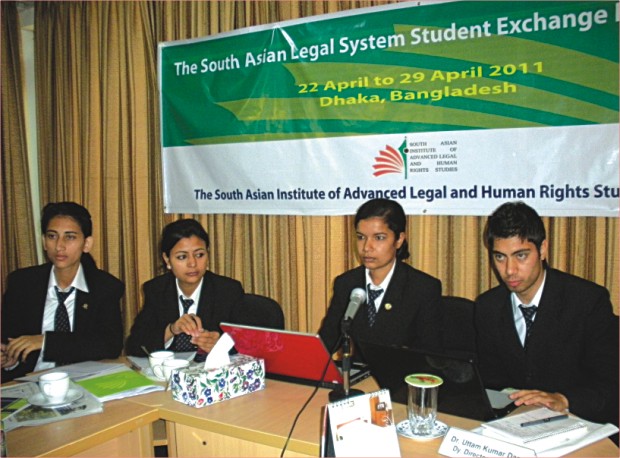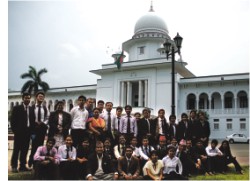Culture Exchange
When Great Ideas Meet
Sameeha Suraiya
It is often said that ignorance is a luxury in this modern day. While some would rather live in the bliss it affords while standing beside the truth, because it certainly makes life a lot easier, there are others who would go around the door, break down a wall if necessary, to see that other side. What comes forth may be a lifelong lesson or simply, just a clearer understanding. It was in the spirit of connecting two very different groups of people to share theories and opinions while looking for the common ground that South Asian Institute of Advanced Legal and Human Rights Studies (SAILS), an autonomous institute based in Dhaka that aims to promote legal knowledge and respect for human rights throughout South Asia, organised a dynamic exchange programme in Dhaka.

Nepali law students making their presentations at SAILS. Photo: Dr. Uttam Kumar Das.
35 Law students from Nepal and Bangladesh joined this programme that broke new grounds in addressing various legal systems and human rights issues. 16 students from Kathmandu School of Law, 4 from University of Dhaka, and 2 each from Jagannath University, University of Rajshahi, University of Chittagong and Islamic University joined the programme that began on April 25. Seven days were spent in the company of the some of the most brilliant minds of the judiciary world. Human Rights Activist Advocate Sultana Kamal, Jurist Dr. Kamal Hossain, National Human Rights Commission Chairman, Dr. Mizanur Rahman and Barrister Sara Hossain were a few of the speakers who conducted stimulating seminars and workshops during the course of the programme.
Although the two countries are culturally and geographically different, they are essentially South Asian countries that confront some of the same challenges everyday. The common ground was sought and found, as students from the two countries found reflections of each other while raising vital issues that make up for their realities. 'Protection and Promotion of Human Rights', 'Access to Justice: Violence against Women and Children', 'Pro-poor Legal Education in South Asia: Prospects and Challenges', were some of the sessions that students exchanged views over.
 |
Nepali and Bangladeshi law students in front of the Supreme Court.
Photo: Dr. Uttam Kumar Das. |
Balmichisim Tora, a Law major in her 3rd year at the University of Dhaka, and a participant at the programme, thanks her stars for being selected to be a part of what she describes as a “truly great experience”. “The two countries stand so near, yet we know so little of each other. We have so much to share and learn from each other, which is all the more easier because we stand on such similar grounds.” Tora mentions rights to information and rights for women and children as two challenging issues that both the countries fight with on a regular basis. Talking about her experience the last few days, she mentions the places they have visited -- Nagorik Uddyog, Law Commission and International Crimes Tribunal and the Supreme Court -- and has come to the conclusion that all she finds of most importance is the need to understand. “These visits have been eye-opening; I am almost completing my degree, yet I have known so little of the existence and workings of these places. As a legal practitioner, I should first and foremost, know and understand my realities.”
While the students from Nepal present a slideshow, talking about their legal systems, Souvik Das, a 4th year Law student from University of Dhaka, appreciates their practical knowledge. “These students have a far more active role in their communities. They look upon community services as a moral obligation. Here, we youngsters would rather stay away from anything that has the 'voluntary' tag. What happens is we grow a terribly passive attitude to everything around us.” While the students pointed out the sometimes vague laws existing in the constitution that more often than not, are misinterpreted by the people and the practitioners themselves, they valued the interaction between the two countries. “It is a priceless experience. We have brainstormed together and our voices were heard. That is a true achievement.”
Suraj Basnet, Assistant Professor at the Kathmandu School of Law who led his team to the programme, is well-informed about the legal procedures in both Nepal and Bangladesh, and named backlogging of cases, political instability, and gaps between the rich and poor to be a few of the common problems in court proceedings. He wishes for the day when voices of the youth will be heard in the Parliaments of both the countries.
What is of utmost concern is the lack of practicality in the Bangladeshi law studies curriculum. Textbooks remain the only main resort when, clearly, that is not enough. Dr. Uttam Kumar Das, the Deputy Director of SAILS, and one of the masterminds of the exchange programme, is genuinely concerned with the sub-standard course curriculum. “There is a great deal of learning that is taking place in this programme. We want to send a message to the students, that no matter how small your initiatives are, you can always make a difference. It is time they know and apply their understanding in real problems, not simply sit for exams.”
Sudeshna Thapa and Anup Dahal, both in their 2nd year at Kathmandu School of Law, spoke on the common issues that the two countries grapple with. Condition of minority groups and poverty are challenges they see in both the countries. Impressed upon visiting the Supreme Court and the NGO, Uddipan, Thapa commented on the immense progress in terms of infrastructural developments in Dhaka, in spite of its population equalling that of entire Nepal. “We are both South Asian communities in a similar progressive phase. We came knowing very little about Bangladesh. Now, we can identify its problems and strengths as we do have a lot in common.”
When rising to meet prevailing challenges, all borders dissolve to give a common voice. Students, with all their ideals, can cross barriers to bring reforms, and the exchange programme was the perfect example to that.
|
